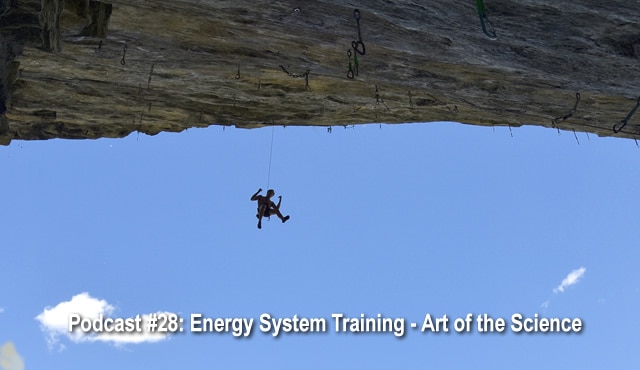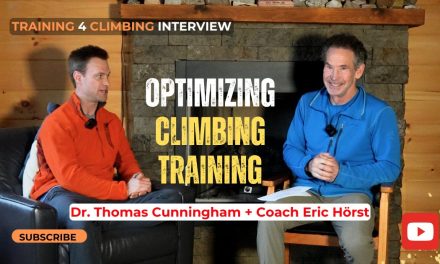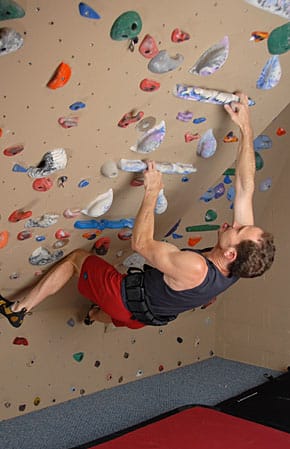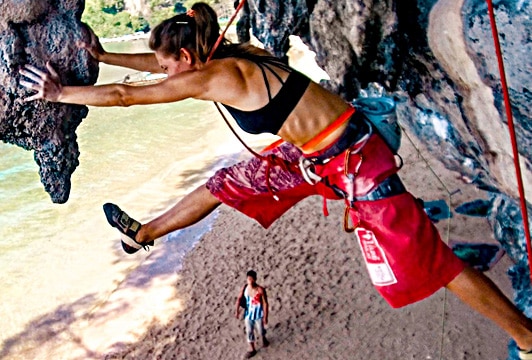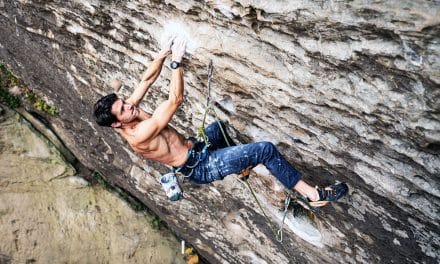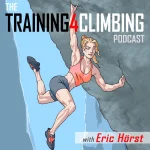This is the fifth and final episode in our study of Energy System Training theory and application. In this 90-minute tour de force, Eric presents the art of the science via 8 key ideas and distinctions to make your energy system training optimally effective. This is powerful material—understanding and applying this cutting-edge sports science will empower you to elevate your training…and climb harder!
Energy System Training #5 Rundown
2:50 – Recap of the genesis of my study of energy systems more than 5 years ago. After a two-year review of the latest research and sports science, I discovered that some aspect of the old school sports science—and even some physiology textbooks—were outdated and even wrong on some important details. Therefore, what I’m trying to do with my book Training for Climbing and these podcasts is apply the latest sports science, research, and training technology to climbing. Only this way will we optimize training programs and advance the sport!
5:20 – What I’m presenting in this series of 5 podcasts is the cutting edge of training for climbing…that may open the door to 5.16a in the next 5 to 10 years…and help the mass of climbers achieve their climbing goals and beyond!
8:15 – Eric shares a brief anecdote from his week at the International Rock Climbing Researchers congress in Chamonix, France…about meeting the Japan National Climbing Team head coach Hiroshi Yasui.
10:58 – The focus of this podcast is the art of the science…via 8 key ideas and distinctions to make energy system training optimally effective. This is important and powerful summary material that will pull together the key concepts from the 4 previous podcasts…and empower you to get the most out of your training both in the short and long term.
13:08 – How advanced training is like playing 3-D chess.
14:20 – Key Idea #1: Though we talk about (and train) them separately, all 3 energy systems contribute toward power in almost every climbing move and training exercise. It’s vitally important to understand how the three energy pathways influence, support, and even inhibit each other.
17:10 – Key Idea #2: Effective energy system training must target a specific pathway as much as possible. To optimally trigger training adaptations, the goal is to maximize the flux through a single energy pathway. You can’t train intuitively…or go to the gym and “just climb”—this approach is too imprecise for an advanced climber to make meaning gains.
21:30 – Key Idea #3: Working on your project is not effective energy system training. Listen and learn why…
24:55 – A quick side story about Alex Megos working on the “Bibliography” project at Céüse…quite possibly a 9c/5.15d route.
27:54 – Key Idea #4: Energy system training for short-term adaptations and long-term gains are two very different things. While the former may help you send your current project, it’s a commitment to the latter that will help you reach your genetic potential.
31:54 – Learn the secrets to long-term gains—which energy system(s) will advance your climbing…and what novel training adaptations you are after. This is brand new material to the climbing world—listen closely! (I first introduced this cutting-edge sport science in the first energy system training podcast in March 2018.)
36:40 – A brief, but important tangent on long-term development and mastery. As exemplified by Chris Sharma and Tommy Caldwell, you too can build-up strength, power, and endurance for 15 or 20 years (perhaps longer)….if you stay uninjured!
43:00 – Key Idea #5: Genetics do play a roll in determining your training gains and absolute climbing potential. That said, you can exert significant influence over your gene expression via the epigenetic effects of your day-to-day diet, training, and lifestyle. Energy System Training is one way to exert influence over your genes!
54:06 – Key Idea #6: A two-a-day workout schedule can be very beneficial for advanced/elite climbers, but the two sessions should be separated by 6 to 8 hours to optimize workout quality and minimize interference (of adaptation signaling). Intense strength/power workouts are best done in the afternoon or evening, so other forms of training—aerobic climbing, generalized aerobic activity, and similar—are best done early in the day (based on science). Of course, everyone is different (genetics, time available, other life issues)…and so your “best schedule” might require a different approach. #Nuance
1:00:30 – Bonus tip: Reduce or eliminate your antagonist training during your climbing performance season. Learn why this will help a well-trained, non-injured climber perform a bit better.
1:03:00 – Key Idea #7: You can learn and benefit a lot by keeping records of your workouts, subjective feelings, key performance indicators, and your climbing achievements. Digital and other online records, like 8a.nu and Vertical-Life.info, are a good place to start; but written records have great value, too. Learn why.
1:06:35 – Key Idea #8: Energy system programming is the ultimate “art of the science”. Getting long term results requires a knowledgable coach, accurate testing, and progression program design that is artfully crafted around periods of performance climbing and/or competition. Personalized training is essential—nuance is key.
1:08:47 – Eric offers training program advice for beginners.
1:11:55 – Some programming tips for intermediate/accomplished climbers.
1:14:45 – Short- and long-term training program advice for advanced weekend warriors and professional/elite climbers.
1:22:27 – Summary comments about energy system training and the future of training for climbing. How high quality information and coaching is like a power tool that, through leverage, multiplies your current strength, talent, and climbing ability. Seek out the best information and coaches available—and become the best climber you can be!
1:24:00 – My thoughts on how becoming a better climber can make you a better human being…and empower you to positively impact other people (and perhaps change the world!) in small, but meaningful ways.
Please Share the T4C Podcast!
Use the download and embed links in this player window to share this podcast on your social media or climbing blog. Thank you!
- For more on energy system training (and a myriad other training tips and techniques) pick up a copy of the latest edition of the best-selling Training for Climbing.
Follow Eric on Twitter @Train4Climbing
Check out Eric’s YouTube channel.
Music by: Misty Murphy
Subscribe on iTunes (or other podcast player) to “Eric Hörst’s Training For Climbing” podcast. You can also listen to the T4C podcast on Spotify! Please write a review on iTunes!
Copyright © 2000–2018 Eric J. Hörst | All Rights Reserved.

